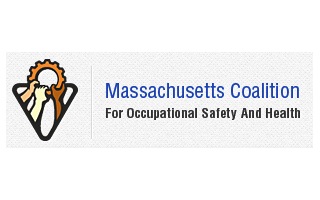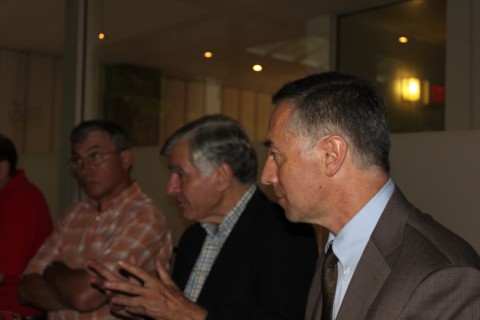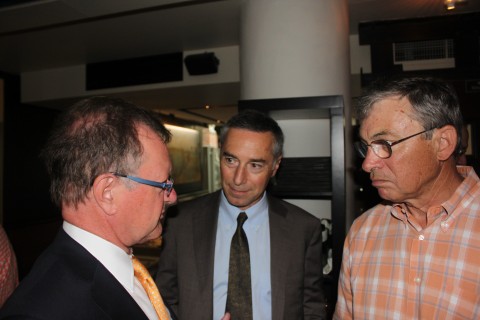by Admin | Sep 16, 2013 | News
The Massachusetts Coalition for Occupational Health and Safety, or simply MassCOSH, is a Boston-based organization striving to improve work place safety, security and health throughout the state. The team collaborates with unions, legal and health professionals and community groups to voice and address issues faced by vulnerable communities in their work places. MassCOSH Executive Director, Marcy Goldstein-Gelb describes the organization’s focus areas for action and echoes the shared vision of worker welfare with Boston Global Forum.

In the summer 2006, tragedy stuck busy downtown Boston when a scaffold plunged from a building onto the congested road below. Falling with the three-ton structure were two workers who did not survive the impact. The heap of steel and material also crushed one of the many cars below, killing a young doctor who worked close by. The loss of life was widely covered by the media, with the Boston Globe noting that there was going to be a “hunt for answers” by state leaders to prevent such workplace deaths from ever happening again.
However, when Yogambigai Pasupathipillai was killed in August while working at aMalden bakery, there was no “hunt” by state leaders or reporters swarming to the scene. Unless you were a family member mourning such a devastating loss, you probably never even knew about the accident at all.
Yogambigai became yet another victim to an epidemic that silently claims the lives of hundreds of thousands of people every year – workplace fatalities. Here inMassachusetts, the Massachusetts Coalition for Occupational Safety and Health, or MassCOSH, a nonprofit worker safety organization, has found that, on average, a worker dies on the job each week due to dangerous conditions and hundreds more suffer from serious illnesses due to a work-related exposure that robs them of their health and vitality. When these events and exposures occur, families and co-workers mourn, but it rarely makes the papers. When the media does notice, it is often referred to as a freak accident, not a preventable incident worthy of a “hunt for answers”.
Here at MassCOSH, where workers and families contact us each day with horror stories of poor conditions, debilitating injuries and threats of retaliation for reporting an injury, we double down our efforts to ensure every worker has the right to a safe, secure job. At every level of our communities – from workers, to employers, to government enforcement agencies to elected officials, we all have an obligation to end tragic and nearly always preventable job injuries, illnesses and death.
At MassCOSH, we believe state policymakers can literally be lifesavers if they have a vehicle for gathering stories of workplace accidents and analyzing what can be done to prevent them from happening again. Here in Massachusetts, we are fortunate to have a nationally recognized state Occupational Health Surveillance Program within the Department of Public Health which is dedicated to doing just that. Unfortunately, they are grossly underfunded, depending primarily on federal grants, and the critical data they collect is not analyzed with the same public scrutiny the way our state budget line items and gambling forecasts are.
At MassCOSH we work hard to bring forward the stories of workers , issue reports combining state and federal data to educate elected officials, and alert the community to the needless workplace deaths that plague our state so that we can have a collaborative approach to creating policies that save lives. A recent success of this strategy was the 2010 passage of a state ban of a deadly floor finisher, the first in the nation. For over a year, MassCOSH convened a task force to investigate a highly combustible floor finisher that killed three workers in massive blazes and caused home fires across the state. The stories and data were irrefutable: the product was unnecessary and caused harm to workers and home-owners. Without a united front of workers, data, and allies, the fatal product might still be in use today. Instead the Patrick Administration and elected officials headed the MassCOSH task force’s warnings and banned the product.
While MassCOSH works hard to gather stories and data to impact change, we are a small organization with tightly stretched resources. With a staff of just eight, we operate an immigrant worker center that helps thousands of the very lowest wage workers address dire conditions from labor trafficking to wage theft to life-threatening conditions. Our youth program engages a team of 15 teen leaders in leading health and safety trainings for over 500 other teenage workers in communities of color each year. Our healthy schools initiative helps eliminate environmental hazards in schools that contribute to asthma. We also ensure that not a day goes by without an effort to educate the public that together, we can make workplace fatalities a thing of the past.
By partnering with the Boston Global Forum, MassCOSH’s impact can be magnified substantially. BGF’s dynamic network of talented, concerned and well-networked individuals can lend some strategic muscle to uphill legislative battles and help MassCOSH grow in size and influence. MassCOSH could particularly benefit from an expanded pool of business allies who see regulations as life-savers and not needless and expensive excess that would only “hurt profits.” Together, we can and will save lives.

by Admin | Jul 26, 2013 | Highlights
Boston Global Forum brings together leaders and renowned professors from Harvard and MIT to lead the discussion on worker safety.

Professor Richard Locke (far right) addresses the group as Governor Michael Dukakis (center) and Professor Thomas Kochan listen on.
July 18, 2013 Boston- To propel discussions around Boston Global Forum’s (BGF) 2013’s ‘Issue of the Year’, a group comprising BGF Chairman Michael Dukakis, BGF Executive Director, Nguyen Anh Tuan, distinguished academicians from universities like Harvard and MIT, and representatives from non-profit advocacy groups met last week in Boston to discuss Minimal Standards for Worker Safety . The infamous Rana factory collapse in Bangladesh that killed over 1100 people in April 2013 is the inspiration behind BGF’s Mission for 2013.
Evoking the genesis of Boston Global Forum and its choice of mission for 2013, Governor Dukakis opened the meeting by reminding its participants that BGF was created to reach out to the entire world using information technology to initiate a global conversation around of the issue of the year. This conversation, unlike most others, would be solution-oriented– one that results in a set of recommendations that could be “internationally enforced”. He further added that there was a stark absence of international conversation around the issue of occupational safety, and hoped that the forum could leverage a dialogue “in a way that could build a body of law that is enforceable.”
The meeting addressed several aspects of international worker safety drawing upon examples of supply chain policies, private and public sector arrangements and trade agreements. Richard Locke, professor of Political Science at Brown University and author of The Promise & Limits of Private Power stated that the best success stories, in his understanding of the processes, lie in the combination of private and public sector interventions. While private enterprises are necessary to ensure efficiency (in keeping with their best interest), the government needs to enforce basic enabling rights for workers. “Where you see that combination, that’s where you see success, “ adds Locke. He illustrated his theory with the Better Work Cambodia Program directed by the International Labor Organization (ILO). In this program, the United States used its markets as a “carrot” to drive improvements in working conditions and safety standards. The resulting improvement in worker safety which was made possible by the combined efforts of local governments, private business and the ILO.
The round-table, comprised of American luminaries, rebuked the response of American multinationals to the Bangladesh tragedy. “We’ve got to take advantage of putting pressure on the multinationals and the US multinationals have been slow relative to the Europeans,” said Thomas Kochan, Co-Director MIT Sloan Institute for Work and Employment Research. While European multinationals are putting pressure to change labor law in Bangladesh after the tragedy, American corporations like Walmart and Gap, are withholding involvement with trade unions on the ground or international alliances, he said. Jeffrey Stookey, former professor at Boston University augmented this idea by pointing out that European Union stopped bank loans to Bangladeshi companies that fell short of safety standards. John Quelch, professor at Havard Business School also pointed out that the US has failed in stepping up to this challenge- a behavior that is inconsistent with its reputation of a country that pioneered positive global interventions in the 20th century.

Harvard Business School Professor, John Quelch (left) talks to MIT professors Richard Locke (center) and Thomas Kochan (right).
The Rana Plaza factory collapse draws emphasis to the need to talk about a subject that hasn’t received enough attention. Quelch recalled his experience leading a business school in China to talk about the “less-than pleasant practices” that workers have to endure. He hoped that the Bangladesh tragedy could work as a “catalyst” to stimulate discussions on an often-overlooked issue. Professor Quelch went on to emphasize the need for legislation in bringing about any stringent change in worker safety. “Even with legislation, it’s often difficult to make things stick as well but without it I feel that, personally, it’s going be tough to keep the interest and momentum up,” he said. While addressing human rights concerns, Quelch pointed out that children have, unfortunately, been left out of conversations surrounding the Bangladesh disaster. Rendered helpless by their vulnerability, children are often the worst victims of disasters and calamities.
Incidents like the Bangladesh disaster cannot be averted by enforcing legislation alone. MIT’s Thomas Kochan argued about the need for a bottom-up approach in addressing this subject. He stated that sustained enforcement of labor law could be achieved through the development of local institutions like trade unions, NGOs and coalitions resulting between them.
State laws within the US have attempted to ensure transparency and labor standards in procurement processes, sometimes with success. Liana Fozvog from International Labor Rights Forum (ILRF) and Marcy Gelb from MassCOSH (Massachusetts Coalition for Occupational Safety and Health) described their findings stating that several states and cities across the country have joined a sweat-free consortium that should ideally be instituted at the federal level. In Massachusetts, laws that require disclosure of factories and apparel to be union-made are not always upheld.
Moving Forward
The meeting culminated in dialogue about future actions for Boston Global Forum. Recommendations included a ten-point plan for the Commonwealth to help position Massachusetts as a ‘best practice state’ in the field of worker safety; networking to encourage American multinational companies to participate in future meetings on compensating victims of the Bangladesh disaster; bringing together various stakeholders and actors to talk about solutions that have worked and about governments, private institutions and other organizations that are making a difference; transforming the Boston Global Forum website into an information resource for interested audiences; garnering interest and representation from the State Department or the Department of Labor in BGF’s discussions; inviting Human Rights and Business expert Michael Posner, professor at New York University’s Stern’s School of Business and former official at the State Department to join the forum; and addressing local state laws in Massachusetts that are not being effectively enforced.



